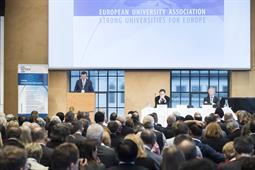EUA launches European-wide debate on university autonomy
07 April 2017

This week, EUA renewed a crucial and timely European-wide dialogue on the importance of university autonomy. Its Annual Conference, “Autonomy and freedom: The future sustainability of universities,” underway at the University of Bergen in Norway, marks ten years of EUA work on the topic. This debate comes at a pivotal moment as there is an increasing tendency of national governments to interfere in university autonomy and academic freedom.
In a statement issued from Bergen yesterday, EUA members called on the Hungarian president to block legislation targeting the Central European University, a long-standing EUA member. On 4 April 2017, the Hungarian Parliament adopted an amendment to the country’s Education Law that, if signed by the president, will make further operations of CEU in Hungary almost impossible. EUA’s statement stresses that autonomous institutions should be left to govern themselves free of state interference and oppression.
“University autonomy and academic freedom are crucial for the well-functioning of universities and higher education systems,” said EUA President Rolf Tarrach. “They are essential pillars of the future sustainability of our institutions.”
Earlier in the week, EUA underlined the importance of universities as independent and open communities of scholars. EUA cited the case in Hungary, as well as worrying reports of governmental interference in internal university affairs in Turkey following the attempted coup in July 2016.
To support the broader dialogue, EUA presented the state of play on university autonomy in Europe at the Annual Conference with the launch of its newly-updated Autonomy Scorecard. The extensive study profiles and scores 29 higher education systems and is a central reference in discussions and analyses of institutional autonomy – both in Europe and beyond.
While EUA’s analysis shows some improvements, it also reveals new restrictions in several areas as well as a lack of a global view on university autonomy. More specifically, the findings indicate that university autonomy is affected both by legal restrictions and factors such as stronger accountability measures and micromanagement. The challenging economic context impacts autonomy in financial management, staffing matters and organisational aspects. In addition, public authorities exert stronger steering through funding mechanisms, while concentration processes, like mergers, raise new questions for university autonomy.
“The EUA Autonomy Scorecard offers a university perspective while contributing to national and regional policy dialogues by providing data and structure to a complex topic,” said Thomas Estermann, EUA Director of Governance, Funding and Public Policy Development.
EUA will continue to monitor developments in autonomy and academic freedom across Europe, keeping with its founding aim of “promoting and safeguarding university values and the case for university autonomy,” and provide a forum for such dialogue at the European level.
Photo: Dag Rune Olsen, Rector, University of Bergen; Torbjørn Røe Isaksen, Norwegian Minister of Education and Research; Rolf Tarrach, EUA President
